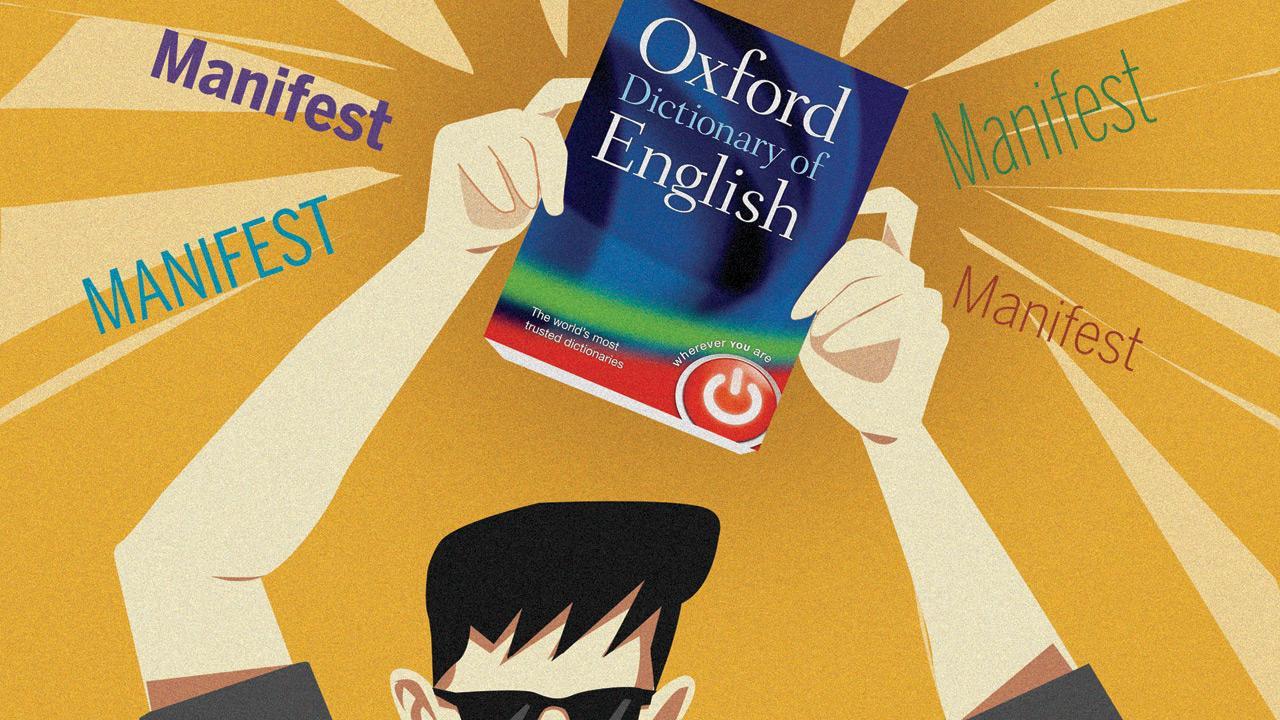The Secret was not itself new. It reframed similar ideas popular since the late 19th century. I guess, since the book has sold over 30 million copies, it wasn’t much of a secret anymore, and a re-brand was called for. Enter, “manifest”.

Illustration/Uday Mohite
![]() Not that anyone had the illusion that the Oxford dictionary word of the year (for English speakers anyway) would be genocide. But I was certainly surprised that the word that captured 2024 was “manifest”.
Not that anyone had the illusion that the Oxford dictionary word of the year (for English speakers anyway) would be genocide. But I was certainly surprised that the word that captured 2024 was “manifest”.
ADVERTISEMENT
I won’t deny I rolled my eyes. After all as a Gen X’er I was there when this thing began—in the era of The Secret, that inescapable bestseller by Rhonda Byrne, which proposed that you can attract what you want through positive vibes. Visualize it and its yours it said, providing several anecdotes as evidence of this methodology.
The Secret was not itself new. It reframed similar ideas popular since the late 19th century. I guess, since the book has sold over 30 million copies, it wasn’t much of a secret anymore, and a re-brand was called for. Enter, “manifest”.
You may, rightly, scold me for my skepticism. After all the thing we call a self-fulfilling prophecy, that if we are convinced we will fail, we will do things that lead to failure, is the same as manifesting. Every vrat katha is structured like The Secret. If you keep the vrat, by the 16th day like all the others in the katha-anecdotes, you will win back your husband, acquire a mansion, or have a son and become sabki favourite. And every teleshopping network advertisement is structured like a vrat katha—if you use the gemstone, the penis enlarger, the herb mixture, then just like Kamal, Heera or Mohan, you will grow taller, richer, more virile.
Words recur through the ages, manifesting new meanings birthed in those times. In capitalism’s early years, manifest meant a ship’s cargo. What does it mean in the age of late capitalism? Often, the influencer types who propagate the power of manifesting, leave out the power of privilege, cosmetic surgery, a PR team, dogged practice and some random good luck. The idea that you can manifest something alone prevents you from imagining you could build something together, with others. Then even our relationships risk becoming instrumental, serving the goal of manifesting, rather than allowing us the opportunity to grow and change together, to bear each other, to accept the flawed with the fabulous.
Focusing on an individual goal blurs out, as in portrait mode, the complex reality which is the true backdrop of our endeavours. It may seem rooted in hopes and dreams, but it’s also an attempt to inoculate ourselves from rejection. It’s not just about accepting “reailty”. It’s just that disappointment is also a way of accepting ourselves, and a chance to go towards new dreams.
Words also reveal meanings that don’t find enough place in a time. When, realism is constantly presented as superior to fantasy; when the empirical is elevated as rational, while the emotional, imaginative or mystical are downgraded, as irrational, is it any wonder that we want to present every human yearning as having “scientific basis”. What else is fake news? Why else do we live in a world where both followers and votes can be bought?
Life is an interplay of dreams and reality, one infusing the other, the way songs once infused dreams and desire into movie plots. Both have their place. But when they become interchangeable, and all dreamers must be doers, so then what importance do dreams really have?
Perhaps the trouble with manifesting is not just that its psuedoscince, but psudedofantasy.
Paromita Vohra is an award-winning Mumbai-based filmmaker, writer and curator working with fiction and non-fiction. Reach her at [email protected]
 Subscribe today by clicking the link and stay updated with the latest news!" Click here!
Subscribe today by clicking the link and stay updated with the latest news!" Click here!







